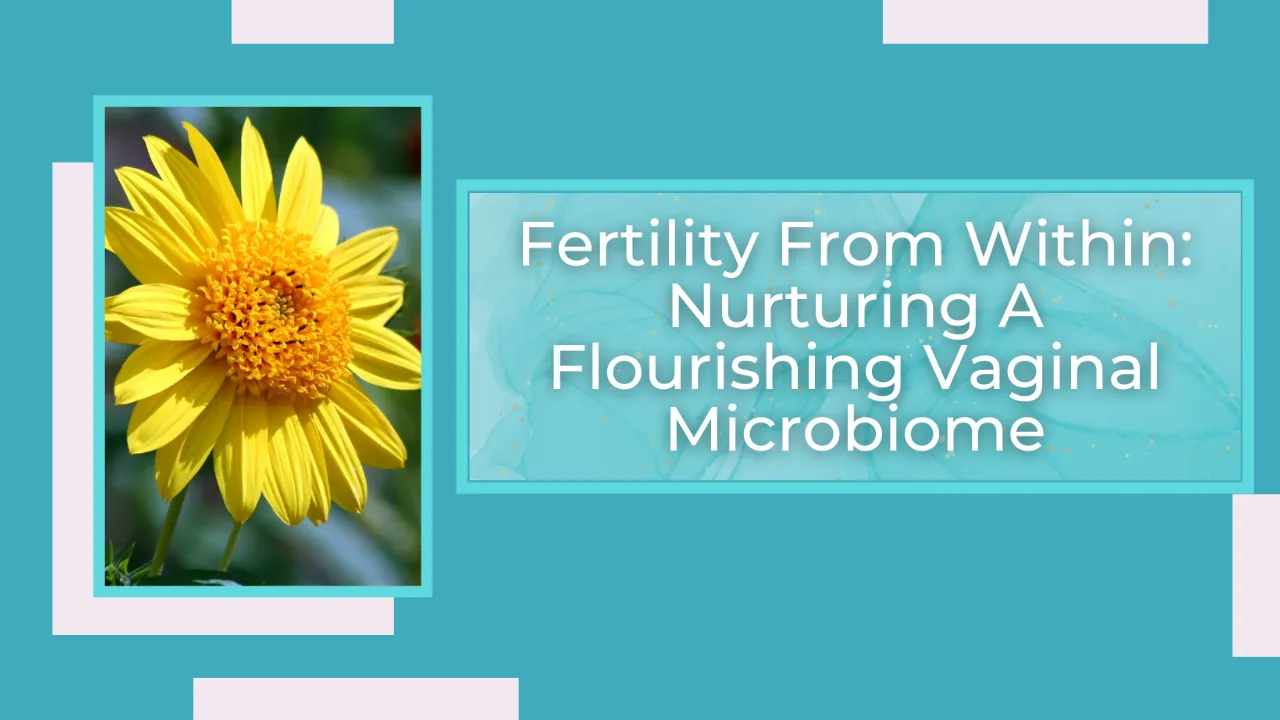What is the Vaginal Microbiome?
The vaginal microbiome refers to the ecology of microorganisms that reside in the vagina. Similar to other parts of the body, the vagina is home to a diverse community of bacteria, fungi, viruses, and other microbes. The composition of the vaginal microbiome can vary from person to person, and it plays a crucial role in maintaining vaginal health.
In a healthy vaginal microbiome, the dominant bacteria are typically Lactobacillus species, particularly Lactobacillus crispatus, Lactobacillus iners, Lactobacillus gasseri, and Lactobacillus jensenii. These bacteria produce lactic acid, which helps maintain an acidic pH level in the vagina (typically between 3.5 and 4.5), creating an inhospitable environment for potential pathogens.
The vaginal microbiome is important for various aspects of women's health. It helps to protect against infections by inhibiting the growth of harmful bacteria, yeast, and other pathogens. The acidic environment created by the Lactobacillus bacteria helps prevent the overgrowth of opportunistic organisms, such as Candida (which can cause yeast infections) and certain sexually transmitted infections (STIs).
Imbalances in the vaginal microbiome, known as dysbiosis, can occur for various reasons, such as the use of antibiotics, hormonal changes, sexual activity, douching, and certain health conditions. Dysbiosis can lead to a decrease in beneficial Lactobacillus bacteria and an overgrowth of other bacteria, such as Gardnerella vaginalis, Atopobium vaginae, or Prevotella species. This shift in microbial composition can increase the risk of infections, including bacterial vaginosis (BV) and urinary tract infections (UTIs).
Research is ongoing to better understand the vaginal microbiome and its impact on women's health. Scientists are studying the role of the vaginal microbiome in fertility, pregnancy, menopause, and the development of various vaginal and reproductive tract disorders. By understanding the vaginal microbiome, it may be possible to develop new strategies for maintaining vaginal health, preventing infections, and improving overall well-being.
How Does Vaginal Microbiome Affect a Woman's Fertility?
The vaginal microbiome plays an important role in a woman's fertility health. The balance and composition of the vaginal microbiota can influence various aspects related to fertility. Here are some ways in which the vaginal microbiome can affect a woman's fertility:
- Cervical mucus quality: The cervical mucus changes in consistency and composition throughout a woman's menstrual cycle. During the fertile window, the mucus becomes thinner, clearer, and more stretchy, creating an optimal environment for sperm survival and motility. The presence of certain Lactobacillus species in the vaginal microbiome helps maintain the quality of cervical mucus, facilitating the transportation and viability of sperm.
- Implantation success: After fertilization, the fertilized egg (embryo) needs to implant into the uterine lining for pregnancy to occur. The vaginal microbiome can influence the endometrial environment by modulating immune responses and affecting the receptivity of the uterine lining. An imbalance in the vaginal microbiome, such as a decrease in Lactobacillus species, may affect the implantation process and reduce the chances of a successful pregnancy.
- Infections and inflammation: Dysbiosis in the vaginal microbiome, characterized by an overgrowth of certain bacteria or a decrease in beneficial bacteria, can increase the risk of infections such as bacterial vaginosis (BV) or sexually transmitted infections (STIs). These infections can lead to inflammation in the reproductive tract, which may have adverse effects on fertility by disrupting the normal functioning of the fallopian tubes, ovaries, or uterus.
- Assisted reproductive technologies (ART): For women undergoing assisted reproductive technologies, such as in vitro fertilization (IVF) or intrauterine insemination (IUI), the vaginal microbiome may impact the success of these procedures. An imbalanced vaginal microbiome has been associated with decreased implantation rates and lower pregnancy outcomes in women undergoing ART. Optimizing the vaginal microbiome before and during these procedures may improve the chances of successful conception.
Studies that show Vaginal Microbiomes affect a woman's fertility health.
Research on the relationship between the vaginal microbiome and fertility health is an active area of investigation. While our understanding of this connection is still developing, there are several studies that have explored the impact of the vaginal microbiome on fertility. Here are a few noteworthy studies:
- "The vaginal microbiota and gynecological cancer: practice and implications" (2019) - This review article examined the relationship between the vaginal microbiota and gynecological cancers, including cervical, endometrial, and ovarian cancer. It highlighted the role of the vaginal microbiome in modulating inflammation and immune responses, which could potentially also influence fertility.
- "The vaginal microbiota, human papillomavirus infection, and cervical intraepithelial neoplasia: what do we know and where are we going next?" (2017) - This review article explored the association between the vaginal microbiome, human papillomavirus (HPV) infection, and the development of cervical dysplasia, also called cervical intraepithelial neoplasia (CIN). It discussed the potential influence of the vaginal microbiota on HPV persistence, clearance, and the progression of dysplasia, which could impact fertility outcomes.
- "Vaginal microbiome and its relationship to behavior, sexual health, and sexually transmitted diseases" (2014) - This study investigated the vaginal microbiota composition in women and its association with sexual behaviors, sexual health, and the risk of sexually transmitted infections (STIs). It highlighted the importance of a healthy vaginal microbiome in maintaining reproductive health and reducing the risk of infections that affect fertility..
- "The vaginal microbiome and infertility: a systematic review and meta-analysis" (2020) - This systematic review and meta-analysis analyzed multiple studies to evaluate the association between the vaginal microbiome and infertility. It found that women with an abnormal vaginal microbiome had a higher risk of infertility, suggesting that an imbalanced vaginal microbiota may adversely affect fertility outcomes.
- "The vaginal microbiota and its potential impact on in vitro fertilization outcomes" (2019) - This study investigated the association between the vaginal microbiota and in vitro fertilization (IVF) outcomes. It found that women with a Lactobacillus-dominated vaginal microbiota had higher rates of successful embryo implantation and clinical pregnancy compared to those with a non-Lactobacillus-dominated microbiota.
Tips to improve vaginal microbiome naturally
Maintaining a healthy vaginal microbiome is essential for overall vaginal health. While individual microbiomes can vary, there are some general tips you can follow to support a balanced and thriving vaginal microbiota. Here are some natural tips to improve your vaginal microbiome:
- Practice good hygiene: Gently clean the external genital area with warm water and mild, fragrance-free soap. Avoid using harsh soaps, douches, or feminine hygiene products that can disrupt the natural pH and bacterial balance of the vagina.
- Good hygiene, yes, but avoid excessive washing: Overwashing or using strong cleansers can strip away the body’s natural protective barrier. Stick to gentle cleansing and avoid excessive washing to allow the vaginal microbiome to maintain its natural balance.
- Opt for cotton underwear: Wear breathable, cotton underwear that allows air circulation and helps absorb moisture. Avoid tight-fitting synthetic underwear (and pants) that can trap heat and moisture, creating an environment conducive to bacterial overgrowth.
- Be mindful of lubricants and condoms: Some lubricants and condoms may contain additives, fragrances, or spermicides that can disrupt the vaginal microbiome. Opt for water-based, fragrance-free lubricants, and choose non-latex condoms if you have sensitivities. Good Clean Love and Ah Yes are both brands that we like.
- Probiotics: Probiotics are beneficial bacteria that can help restore and maintain a healthy vaginal microbiome. Look for probiotic supplements or foods that contain specific strains known to promote vaginal health, such as Lactobacillus rhamnosus, Lactobacillus crispatus, or Lactobacillus reuteri. These can help replenish the population of beneficial bacteria in the vagina. It's important to consult with a healthcare professional to get advice on a high-quality supplement, and your specific needs, before starting any new supplements.
- Eat a balanced diet: A nutrient-rich diet can support overall health, including vaginal health. Include a variety of fruits, vegetables, whole grains, and lean proteins in your diet. Some studies suggest that a diet rich in plant-based foods and low in processed sugars may be beneficial for the vaginal microbiome.
- Manage stress levels: High levels of stress can impact the body's immune system and hormonal balance, which may affect the vaginal microbiome. Engage in stress-reducing activities such as exercise, meditation, yoga, or hobbies that help you relax and unwind.
- Practice safe sex: Consistent and proper use of barrier methods, such as condoms, can help prevent sexually transmitted infections (STIs) that can disrupt the vaginal microbiome. It's important to discuss and follow safe sex practices with your partner.
The research on the relationship between the vaginal microbiome and fertility is still developing, and there is much more to learn. Further studies are needed to fully understand how the vaginal microbiome influences fertility specifically and to develop interventions for improved reproductive outcomes. It's important to note that each person's vaginal microbiome is unique, and what works for one individual may not work for another. If you have concerns or symptoms, it's best to consult with a healthcare professional for proper evaluation and guidance.

